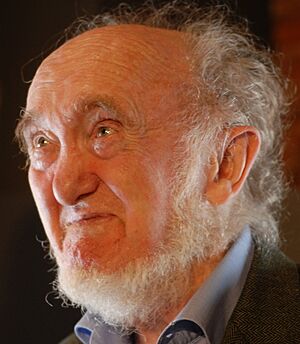Albert Jacquard facts for kids
Quick facts for kids
Albert Jacquard
|
|
|---|---|

Jacquard in 2009
|
|
| Born | 23 December 1925 Lyon, France
|
| Died | 11 September 2013 (aged 87) Paris, France
|
| Alma mater | Polytechnical School Stanford University (PhD) |
| Awards | French Légion d'honneur (1980) French Ordre national du Mérite (1980) Fondation de France scientific medal (1980) |
| Scientific career | |
| Fields | Genetics |
| Institutions | Institute of statistics SEITA (Paris) French Court of Financial Auditor French Institute for Demographic Studies World Health Organization French Comité consultatif national d'éthique |
Albert Jacquard (born December 23, 1925 – died September 11, 2013) was a French scientist. He was a geneticist, which means he studied how traits are passed down through families. He also loved explaining science to everyone and wrote many books.
Albert Jacquard was known for speaking up about important ideas. He cared deeply about science, protecting the environment, and helping people who needed it. He believed in using fewer resources and living more simply. For ten years, he was also an active member of a French political party that aimed to help society.
Contents
Early Life and Education
Albert Jacquard was born in Lyon, France. His family was Catholic and traditional. When he was nine years old, he was in a car accident. Sadly, his brother died in the accident, and Albert was badly injured.
Despite this, he was a brilliant student. In 1943, he earned two high school diplomas. One was in mathematics and the other in philosophy. In 1948, he earned a master's degree in engineering. This was from a famous French school called the École Polytechnique. After that, he joined the French Institute of Statistics.
A Career in Public Service
In 1951, Albert Jacquard started working for a French tobacco company called SEITA. He helped them organize their work better. Later, he worked for the French Court of Financial Auditor. This group checks how the government spends money. He also held a senior position in the French Health Ministry.
In 1966, he decided to study more. He went to Stanford University in the United States. There, he focused on population genetics. This field looks at how genes change in groups of people over time. When he returned to France in 1968, he joined the French Institute for Demographic Studies. He became the supervisor of their genetics department.
His expertise was recognized worldwide. In 1973, he became a genetics expert for the World Health Organization (WHO). The WHO is a part of the United Nations that works to improve global health. He retired from his official roles in 1985.
Teaching at Universities
Even while working for the World Health Organization, Albert Jacquard shared his knowledge. He taught as a visiting professor at several universities. These included the University of Geneva in Switzerland (1973–1976). He also taught at Pierre and Marie Curie University in Paris (1978–1990). Another place he taught was the Catholic University of Louvain in Belgium (1979–1981).
His important work was honored with several awards. He received the Légion d'honneur and the Ordre national du Mérite. These are two of France's highest awards. He also received a scientific medal from the Fondation de France.
Standing Up for What's Right
Albert Jacquard was very involved in ethical and political issues. He believed it was important to use science for good.
I have no solution: I don't intend to build the society of tomorrow. I just want to show that it must not resemble the society of today.
In the early 1990s, he was part of the French Consultative Committee of Ethics. This committee advises the government on moral issues. He strongly spoke out against selling parts of the human genome. The human genome is like the complete set of instructions for building a human. He believed this information should not be used for business profit.
He was also very supportive of the anti-globalization movement. This movement questions how big companies and governments affect the world. He often defended people who were immigrants without papers and those who were homeless in France. He believed everyone deserved help and respect.
To share his ideas, he wrote many books. He wanted to inspire new generations to think about important issues. He also publicly supported Esperanto. This is a language created to be easy for people from different countries to learn. He thought it could be a good second language for everyone, instead of just English.
 | Stephanie Wilson |
 | Charles Bolden |
 | Ronald McNair |
 | Frederick D. Gregory |

